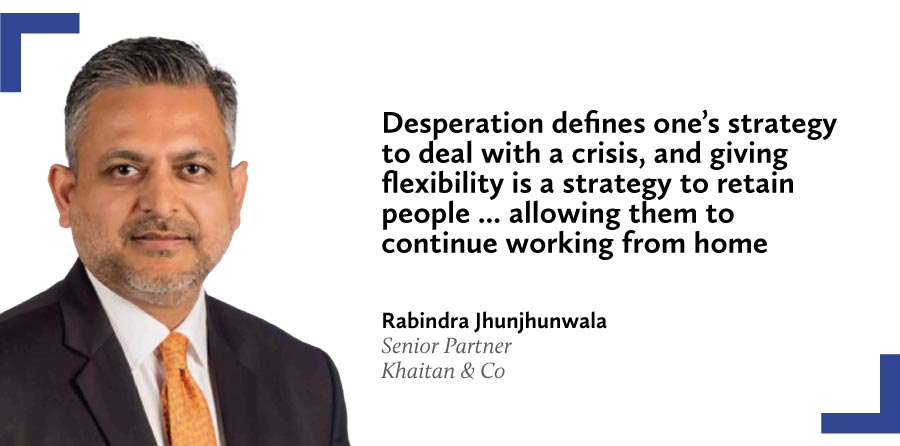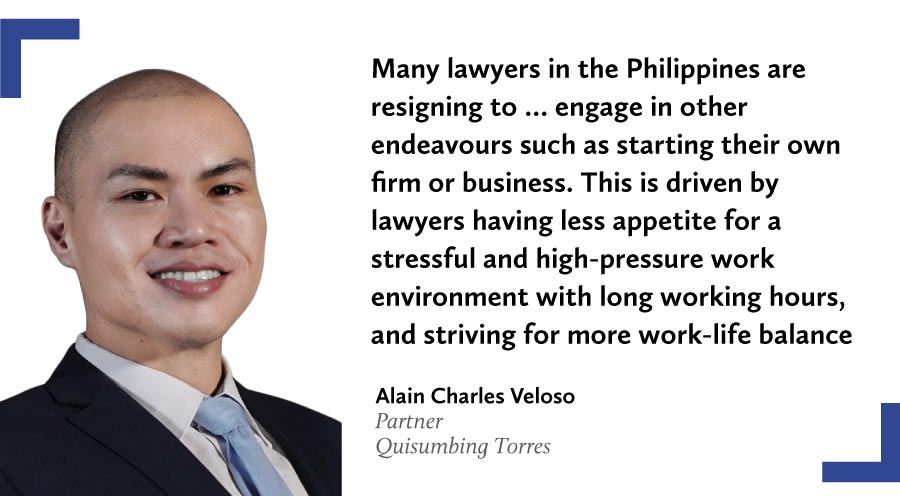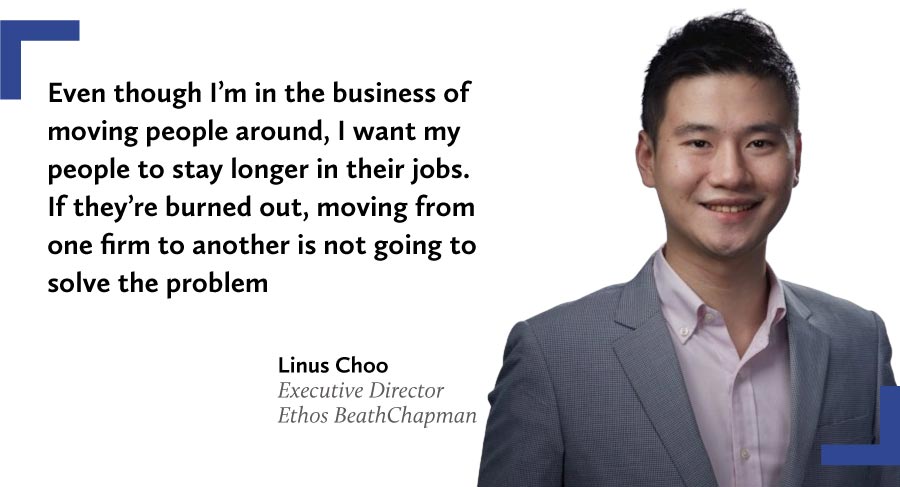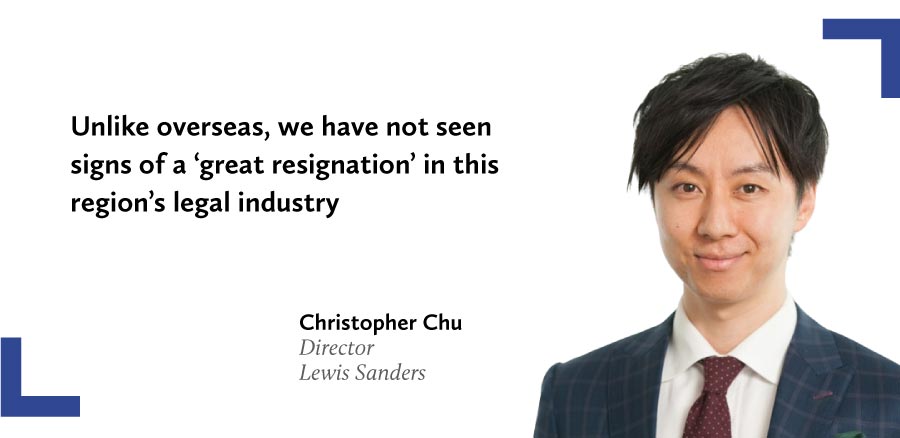Disruption fuelled by global uncertainty has pervaded the dynamics of the legal workforce, with lawyers across Asia not hesitating to seek out new positions. Freny Patel dives into the reasons behind this trend
In his alarmist “great resignation” speech in early 2022, Singapore Law Society president Adrian Tan lamented high attrition in the Lion City’s legal fraternity, alerting warning signals to the rest of Asia to rectify high attrition or face an exodus of talent.
Surprisingly, the pandemic was not to blame. Rather, the biggest challenge he saw was burnout, over which lawyers had been complaining about way before 2020.
“Email and instant messaging mean that young lawyers operate at a far more intense pace, compared to previous generations,” he warned, highlighting mental well-being as a serious cause for concern.
His apprehension was subsequently, more recently, shared by India’s Chief Justice, Dhananjaya Yashwant Chandrachud, who equated junior lawyers to slave workers. At a Bar Council of India gathering, he said junior lawyers were overworked and underpaid, urging senior members of the bar to pay them decent salaries.
Although not sparking this trend becoming known as the “great resignation”, the pandemic surely added fuel to the fire, pushing many lawyers to adjust their working routines, roles, practice areas or even entire careers. In tandem with these developments, say experts, is an urgent need for the region’s law firms to increase pay and improve working conditions if they wish to retain talent. As one lawyer who recently left private practice put it, there is a direct correlation between attrition rates and the empathy of leaders in how they treat their teams.
Many lawyers and legal recruitment agencies India Business Law Journal interviewed agree. There are various reasons for people movement in the legal fraternity. Hitting the glass ceiling, wanting a better work-life balance, lack of confidence in meeting billing targets, and wanting a more meaningful role in the corporate world are just some of the reasons why a new generation of lawyers are not necessarily at one firm for the long haul.
The Wolters Kluwer Future Ready Lawyer Survey 2022 concurs that most legal organisations are not doing very well at delivering on the expectations of their workforce, warning that 70% of corporate lawyers are likely to leave their current positions in the next year.
Amid the pandemic, the Singapore market also saw a higher volume of mid-level associates leave their practices. This void in mid-level senior associates placed greater strain on very junior lawyers, who had to directly interact with partners, says Linus Choo, Singapore executive director at global recruitment agency Ethos BeathChapman.
But, pressed for time, partners could not support the junior lawyers to provide necessary guidance or support. There is always the pressure of deadlines when it comes to private practice service delivery, especially when it comes to arbitration, litigation or corporate transactions, Choo tells India Business Law Journal. “With resources being thin, and with this pressure to deliver, there is hardly time for hand-holding and the interaction is reduced.”
The pandemic has been a game changer, forcing many lawyers to reset and reassess their working conditions, and leaving law firms across Asia grappling with high attrition rates.
Organisations that did not allow employees flexibility lost people to other firms, says Rabindra Jhunjhunwala, a Mumbai-based senior partner at Khaitan & Co. “Desperation defines one’s strategy to deal with a crisis, and giving flexibility is a strategy to retain people … allowing them to continue working from home.”

Perhaps understandably, litigation or arbitration have more stable teams than other practice areas, says Brian Chan, head of the Hong Kong legal practice at Ethos BeathChapman. There has not been a lot of movement in these teams, not even among law firms, because “lawyers engaged in dispute resolution have to attend court or arbitral proceedings that could take a year or two for trials to end”.
On the other hand, transactional practice is largely driven by the state of the capital market. When the market is hot, there’s a strong demand for equity or debt capital markets lawyers, says Chan. When the market contracts, there’s less demand for these lawyers, reflected by an annual attrition rate of 30% to 40% for capital markets legal teams in private practice, and less than 20% for dispute resolution teams in Hong Kong, he says.
At the same time, most Asian markets have witnessed a high demand for data privacy and technology, media and telecommunication (TMT) lawyers. “Triggered by the pandemic, e-commerce has boomed, as has fintech, and there is a lot of demand for these lawyers as clients seek advice in these areas, especially given the rapid regulatory changes,” says Chan. He expects attrition to continue unless most law firms adopt hybrid working arrangements.

GRIM IN INDIA
The grim situation is no different in India, where law firms continue to face an unprecedented exodus of senior, mid-level and junior talent for various reasons including long hours and poor remuneration.
Luthra and Luthra faced a huge exodus in July as senior partners HS Bobby Chandhoke and Sudhir Sharma, together with 63 lawyers, joined DSK Legal. The sudden departures put the firm in crisis mode, the firm’s founder and managing partner, Rajiv Luthra, previously told India Business Law Journal.
With this great resignation more aptly called the “great reshuffle”, the impact can be quite disruptive and costly.
Khaitan & Co also saw some attrition, with Jhunjhunwala adding: “Our rate of attrition is lower than the market.” He says this is because the firm is mindful of its people. “Covid did not have to come and teach us that people matter most and one needs to be sensitive, and ensure flexibility in policies.”
CHINA’S WOES
China’s legal market in 2021 was hotly competitive, with many capital market lawyers moving from one international law firm to another. The Year of the Tiger, however, was not too kind as recruitment took a major hit, largely due to 2022 covid lockdowns and the correspondingly poor capital market.
Quite a few firms tried to scale down their teams, especially among transactional lawyers, due to the quiet capital market and cross-border M&A activity, impacted by border restrictions and cross-border tensions between China and the US, says Winnie Wei, head of China legal practice at Ethos BeathChapman in Shanghai.
Some domestic law firms have not only frozen their headcount, but also asked associates to look for in-house roles. And the situation is no better among international law firms. “With three months of lockdown on the outbreak of covid, and not many IPOs in Hong Kong, recruitment by multinational companies has taken a hit,” says Wei.
As international law firms cannot hire PRC practising lawyers to provide local legal services, many firms such as Allen & Overy, Herbert Smith Freehills and Norton Rose Fulbright opted for alliances or joint offices with Chinese law firms.
With international law firms shrinking, some exited China, including Davis Wright Tremaine, Bryan Cave Leighton Paisner and Troutman Sanders. According to Law.com International, at least 36 senior lawyers at international law firms were also poached by local counterparts.
Not only have international law firms taken a beating. Due to regulatory changes last year, the Big Four auditing giants – PwC, Ernst & Young, KPMG and Deloitte – were forced to shut down their legal affiliations. This saw some partners joining leading PRC law firms, while others took in-house counsel positions, says Wei.
SINGAPORE BURNOUT
The reason for lawyers leaving last year could have been cumulative with work-related burnout due to covid, says Choo at Ethos BeathChapman. The huge pressure on young lawyers working longer hours has forced many to leave and join in-house, or leave the legal practice altogether.
Choo says there is an enormous pressure of deadlines in private practice, especially in the case of arbitration or litigation work, or corporate transactions. He says every year there is also a steady decline in terms of the number of lawyers in Singapore, pointing to many more options available to them. “Many non-legal counsel roles increasingly prefer a legally trained professional,” he says.
Against the number of lawyers leaving, there is a fresh batch of 400 to 500 recruited every year in Singapore.
“If we are losing 30% of current practising lawyers, technically we would see fewer lawyers in practice in the long run unless we find some solutions to plug the gap,” says Choo.

“It’s the perfect place to develop our strategy in the Asia-Pacific region,” says senior associate Pablo Hontoria, who is being promoted to partnership to head the operations. Hontoria sees Singapore as one of the three global financial capitals, the other two being New York and London, where the firm already has a presence.
He says it is “the best hub” from which to approach other countries in this region including China, Japan, Australia, South Korea, Malaysia, Indonesia, India, the Philippines and Vietnam.
HONG KONG HUB
Traditionally, Hong Kong was the city of choice for most international law firms establishing an Asian presence. But the market is evolving as firms diversify regionally, opening offices in Singapore, which explains some movement of lawyers from Hong Kong to Singapore, says Chan. “There is a two-way movement of lawyers as some are now returning to their home country, be it China, Singapore or even in Europe,” he adds.
Christopher Chu, a Hong Kong-based director at boutique legal recruitment agency Lewis Sanders, agrees there has been an uptick in lawyers repatriating or moving overseas from Hong Kong in the past two years. “Covid-related restrictions in Hong Kong have resulted in candidates considering roles in other markets,” he says, although attrition among associates has not been significant enough to cause major concerns for law firms in Hong Kong.

Reasons for associate turnover have been similar to previous years, including looking for a step-up in brand, retraining in other practice areas, more visible prospects, immediate partnership, a better work-life balance, and in-house opportunities, says Chu. If money is the only motive, they are only willing to move for significant increases, he adds.
US law firms, meanwhile, tend to attract experienced associates from the Magic Circle of law firms or other international firms in Hong Kong by offering them salaries based on the Cravath scale, a lockstep associate compensation system based on the number of years out of law school, says Chan, at Ethos BeathChapman.
“The presence of US law firms tends to create higher attrition because their pay scale is more than most international law firms,” says Chan. He adds that the pay scale is higher in Hong Kong than in Singapore or China. In the past, local salaries paid to lawyers from other parts of Asia, including Singapore and China, were 20% to 40% of Hong Kong, but the gap is closing as salaries in China and Singapore increase, he says.
The exit of some US and UK law firms also explains Hong Kong’s high attrition in the past few years. US law firm Baker Botts shut down its Hong Kong office last year.
But the entry of PRC law firms has witnessed significant hiring. Seven of the eight Red Circle law firms are now present in the city, with the exception of Global Law Office.
MOVING IN-HOUSE
Many private practitioners say they are seriously considering in-house opportunities as they offer a better work-life balance, lighter workload, certainty and stability, and in some instances attractive packages, especially in big tech, cryptocurrency or the gaming industry.
Prior to covid-19, China’s young lawyers were not actively looking for in-house roles, and preferred to stay in private practice, focusing on transactional work, says Wei. Post-pandemic, they are looking more at in-house opportunities.
Ashima Obhan, a senior partner at Obhan & Associates in New Delhi, says in-house roles are viewed favourably by lawyers who feel demand on their personal time may be reduced. Becoming part of a business team also improves their professional development.
The role of in-house counsel “has gained more respect in recent years” as more corporations expand their legal teams, says Edward Dhong, a Seoul-based partner at Yoon & Yang. “Many startups offer stock options to lure talent, which gives huge financial benefits compared to staying at a law firm waiting to be promoted to partner.”
Lewis Sanders’ Chu agrees, saying for a number of years many associates have viewed partnerships “as being unattainable or unmaintainable” in the long run. The obvious alternative is an in-house career, he says.
Ashok K Gupta, former group legal counsel and chief legal officer at Aditya Birla Group in Mumbai, concurs. There is pressure on lawyers to get more clients, which is not always easy, given the number of law firms in India, he says.
“Not every lawyer is cut out for this kind of marketing when the preference is for legal work,” while there is no such pressure on in-house counsel, as part of management.
Yet while many large corporations in Europe and the US are run by qualified lawyers moving up the management chain to become chair or CEO, “this is not the case in India”.
Contrary to the past, when private practitioners who moved in-house almost never returned, it is also now a two-way street in Hong Kong, says Chan, citing TMT, data privacy and labour law with a shortage of talent in private practice.
RETAINING TALENT
Singapore Law Society’s Tan suggests the legal profession needs to adopt a new working environment for the new generation of young lawyers if the goal is to retain talent, paving the way for more “virtual law firms”.
With its government support, the law society has therefore initiated a programme to help small and mid-sized law firms to innovate and transform their business to be more digital savvy. Traditional and virtual law firms are likely to compete for legal talent based not just on salary, but the availability of hybrid arrangements and varied career paths, says Tan.
Choo agrees with law firms investing in technology. Apart from the work-life balance, law firms should also regularly set aside time for team bonding, especially in a work-from-home setup, he says.
Lawyers have lots of options today. It is important that associates feel valued, says Choo. “Even though I’m in the business of moving people around, I want my people to stay longer in their jobs. If they’re burned out, moving from one firm to another is not going to solve the problem.”


























